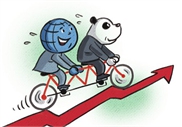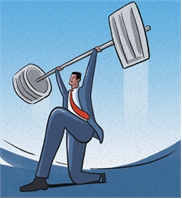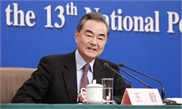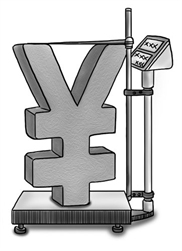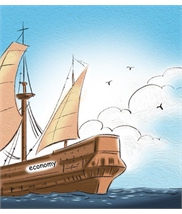New foreign investment law underscores China's determination of further opening-up
China's National People's Congress (NPC), the country's top legislature, passed a new foreign investment law on Friday. The new law would replace three existing laws on various types of foreign investment and signal China's latest round of comprehensive and high-level opening-up.
China determined to stabilize, expand employment
Enhancing vocational education is in line with China's lessons learned from development in the past decades. As China aims to comprehensively develop its economy, skilled workers will play a key role that affects the speed and quality of growth.
Two sessions offer view of China progress
I applaud China for offering such a challenge to Africa and other continents in the world. This is worth aping if we are to foster China-Africa relations.
Beijing will continue to fight against Dalai Lama's separatist goals
Any attempt to separate Tibet from China is doomed to fail. It's noticeable that the influence of the Dalai Lama in the West is declining. As China becomes increasingly powerful, a growing number of Western countries are wary of the country's ability to retaliate if they maintain contacts with and offer support to the Dalai Lama.
China's job market doldrums deserve greater attention
There has been unprecedented attention given to employment at this year's two sessions, with the Government Work Report released last week elevating the employment-first policy to the status of a macro policy for the first time.
China needs to revise, improve law for children's sake
Chinese children are the country's future. And the Law on the Protection of Minors should play the role of “the catcher in the rye” – standing on the edge and catch every kid before they go over the cliff. All Chinese children should be able to play in the big field of rye safely and legally, where a promising future awaits them.
Xi's new diplomatic overture impresses
This is in line with the vision of Xi who once said, “More than 7 billion people inhabit the planet Earth. We in the same boat should keep watch and help each other to achieve common development.”
Transparency defines China's election system
China should choose its own way. China's track record so far is pretty good: No wars on Chinese soil for the past seven decades, and living standards have risen tremendously. Polls suggest fairly high levels of contentment among the population.
Draft law to usher in a new round of foreign investment boom in China
A draft foreign investment law that has been submitted to the second annual session of the 13th National People's Congress (NPC), China's top legislative body, for deliberations last week, is scheduled for a final vote on Friday.
My China experience of the two sessions
With a GDP of over 90 trillion yuan ($13.7 trillion) and an increase of about 3 percent on foreign direct investment of about $135 billion over the year, China has created more than 13 million urban jobs, cutting down on taxes. China has done exceptionally well and managed to stand out among developing nations.
The Chinese government has made many promises during the two sessions. Now we wait and see if China delivers.
Two sessions an opportunity for Beijing to explain its economic thinking
China will soon celebrate its 70th anniversary, meanwhile, the two sessions will provide an outline for the country's priorities in 2019. While China is changing so it can achieve a “new normal,” its policies do not respond only to government goals but also to Western economic demands. This is how a win-win collaboration can be sustained in a multi-polar, globalized world.
Language and vocational training provide Xinjiang with long-term poverty relief
Poverty reduction in Northwest China's Xinjiang Uyghur Autonomous Region was highlighted during the ongoing annual sessions of the 13th National People's Congress and the 13th National Committee of the Chinese People's Political Consultative Conference. Putonghua and vocational training as poverty reduction measures have helped address career disadvantages among ethnic minorities in Xinjiang by providing more opportunities to embrace economic development. These efforts help lift the barriers between ethnic groups and prevent marginalization, a hotbed for breeding terrorism and extremism.
Hainan needs to build distinctive free trade zone for pan S.China Sea cooperation
The Chinese government will prop up South China's Hainan Province in building a pilot free trade zone (FTZ) and gradually exploring and steadily pushing forward the construction of a free trade port with Chinese characteristics, China's Minister of Commerce Zhong Shan told a press conference on the sidelines of the two sessions, China's annual legislative meetings, on Saturday.
FM shows China's clear-cut, confident diplomacy
Chinese State Councilor and Foreign Minister Wang Yi met the press on Friday on the sidelines of the second session of the 13th National People's Congress in Beijing. His answers to 21 questions discussed the outlook and complexity of Chinese diplomacy. As the world's second largest economy and a rising power, China is apparently facing a growing challenge as to how to steer the ship of diplomacy.
Some improvement in women's condition, but much more needs to be achieved
As March 8 approaches, advertisements, special deals, coupons, discounts on make-up, hairdressing and products used by women are on the rise. The commercial side will always be there. I just wish we don't have to get caught up in this since every day can be Women's Day. The last thing Women's Day needs is to be an occasion for shopping.
Beneath the headlines, a tale of development
In the run-up to Mar-a-Lago and beyond, many investors and analysts speculating on China's future will be swayed by market and the White House. During such periods of fluctuation and as the political weather changes daily, it is necessary to look beyond the headlines and to make sense of the larger development story.
Policymakers confident in addressing risks facing China's economy
Several Western media outlets in recent days focused on China's economic slowdown amid coverage of the ongoing annual two sessions being held in Beijing. They raised concerns about various economic risks faced by China, but we noticed most issues were mentioned by the Government Work Report delivered by Premier Li Keqiang to lawmakers on Tuesday. The report speaks more clearly than foreign media outlets about the seriousness of China's economic problems.
Do not give in to tax cut demands for avaricious rich amid income disparity in China
As the National People's Congress (NPC) has opened its annual legislative meeting in Beijing, some of China's wealthiest individuals are asking the lawmakers to cut the income tax rates of the highest earners, but these demands from the rich have met fierce opposition from the middle class and the underprivileged poor.
Risks under control despite slower growth
Some Chinese tend to complain about their country, but the overall confidence of Chinese society is crystal clear. The lives of the Chinese people are improving year by year, and nothing can reverse this trend.
China proud to promote education for ethnic minorities
In the eyes of some Western media, it would be great that Chinese ethnic minority people remain uneducated as the more these people learn, the more clearly they can tell how the West is trying to manipulate their minds.
China's GDP growth target fixed with realities of the country in mind
China's economic slowdown is consistent with the law of economic development. Actually, GDP growth of 6 to 6.5 percent is still eye-catching.
Lower defense budget growth reasonable
Although China has lowered its defense budget growth rate for 2019, the expenditure is still sufficient and reasonable for the country. The decreased rate will not affect research and development in weapons. China will also not compromise on improving soldiers' welfare and equipment.
Two sessions will not dodge tough issues
Plans, decisions and resolutions for the most prominent problems of the moment will definitely be made during this year's two sessions. It is hoped the two sessions will be fruitful.
China requires increase in annual defense budget
Although China's economic growth is slowing down, ordinary Chinese people hope the country can announce a steady increase in its defense budget during the annual plenary session of the National People's Congress, which is scheduled to start on Tuesday.
China-US trade agreement is anything but new version of 'Plaza Accord' sequel
After seven rounds of repeated negotiations, the China-US trade talks seem to have made a breakthrough. US President Donald Trump tweeted the US had “very productive talks” with China on trade. He also announced he would delay the scheduled March 1 tariff increase on Chinese goods.
China's development model belongs to the world
As globalization goes deeper, economic and trade ties between China and most other countries in the world have seen rapid growth. In this new era of high interconnectivity and win-win cooperation, China has learned from the development experience of countries worldwide with a humble attitude and honest diligence to form its unique “socialism with Chinese characteristics” development model. In this process, China borrowed experience from the world's most developed countries and set foot on a development path that was suited to its own situation. This model has powered the economic take-off and soaring growth of China.
In testing time, Beijing must resolutely pursue reform and opening-up at own pace
China has granted German insurer Allianz permission to establish the country's first wholly foreign-owned insurance holding company. The approval, which came several years earlier than anticipated, is a positive signal that the opening-up of China's financial sectors will accelerate.
Economy better served by reform than macro controls
There is a growing view that privately owned enterprises may be facing their most difficult period since 1992. The Chinese economy has experienced many ups and downs, but such pessimism is still rare among private entrepreneurs, and this deserves a high degree of attention from policymakers.



